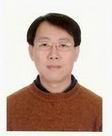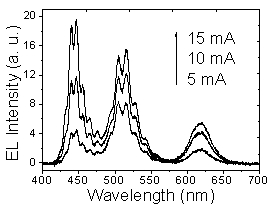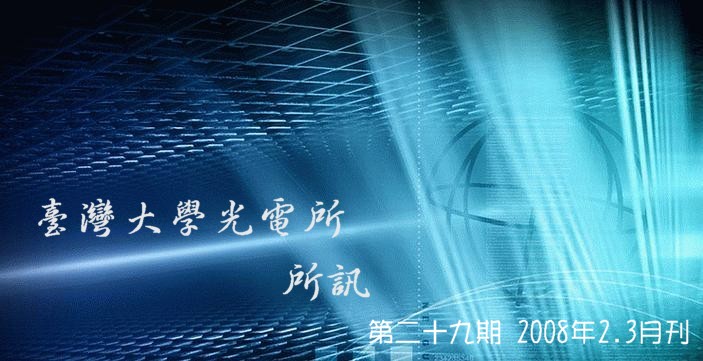
发行人:黄升龙所长 编辑委员:蔡睿哲教授 主编:林筱文 发行日期:2008.03.03
![]() 贺!本所特聘研究讲座蔡振水院士荣获加州大学尔湾校区(UC
Irvine)校长讲座教授(Chancellor
Professorship)之荣誉~
贺!本所特聘研究讲座蔡振水院士荣获加州大学尔湾校区(UC
Irvine)校长讲座教授(Chancellor
Professorship)之荣誉~
|
本所特聘研究讲座蔡振水院士于日前荣获加州大学尔湾校区(UC Irvine)校长讲座教授(Chancellor Professorship)之荣誉,特此恭贺!加州大学系院数年前为了延揽及挽留杰出教授、专家而设立该项讲座教授,目前尔湾校区将近两千位教授中,仅有十八位教授获聘该项讲座。 |
|
![]() 贺!本所林恭如教授获选为2008
SPIE Fellow~
贺!本所林恭如教授获选为2008
SPIE Fellow~
|
本所副所长林恭如教授于日前获选为2008年 SPIE Fellow,成为该协会七十二位新成员之一,特此恭贺!SPIE (The International Society for Optical Engineering) 每年遴选光电相关领域研究上具有重要贡献之学者授予此项荣誉,此次林教授以他于光纤激光与硅奈米光电组件(fiber lasers and silicon nanophotonics)上之具体成就获选为2008 SPIE Fellow。相关消息可参见下列网页:http://spie.org/x32.xml。 |
|
![]() 本所3月份演讲公告:
本所3月份演讲公告:
|
光电论坛 | ||||
|
3/7 (Fri) |
林瑞腾 博士
New Vision Inc. 董事长,
NCTU(国立交通大学光电工程研究所)
客座教授,
ITRI (工研院/南分院)激光应用科技中心顾问,
Hon-Hai Technology Group, Consultant.
|
医疗激光技术之最新进展
Recent Progress in Medical Laser Technologies |
博理馆 101演讲厅 |
16:30-18:30 |
Advanced Numerical Modelling for Photonic-Crystal and Optical-Waveguide Structures
Professor Hung-Chun Chang
Graduate Institute of Photonics and Optoelectronics, National Taiwan University
台湾大学光电所张宏钧教授
A novel analysis method based on a multidomain pseudospectral method is proposed for calculating the band diagrams of two-dimensional photonic crystals and is shown to possess excellent numerical convergence behavior and accuracy. The proposed scheme utilizes the multidomain Chebyshev collocation method. By applying Chebyshev-Lagrange interpolating polynomials to the approximation of spatial derivatives at collocation points, the Helmholtz equation is converted into a matrix eigenvalue equation which is then solved for the eigen frequencies by the shift inverse power method. Suitable multidomain division of the computational domain is performed to deal with general curved interfaces of the permittivity profile and field continuity conditions are carefully imposed across the dielectric interfaces. The proposed method shows uniformly excellent convergence characteristics for both the transverse-electric and transverse-magnetic waves in the analysis of different structures. The analysis of a mini band gap is also shown to demonstrate the extremely high accuracy of the proposed method. (Physical Review E, vol. 75, pp. 026703-1–026703-14, 20 February 2007.)
New full-vectorial optical waveguide eigenmode solvers using pseudospectral frequency-domain (PSFD) formulations for optical waveguides with arbitrary step-index profile are presented. Both Legendre and Chebyshev collocation methods are considered in the formulation. By applying Legendre-Lagrange or Chebyshev-Lagrange interpolating polynomials to the approximation of spatial derivatives at collocation points, the Helmholtz equations for the transverse-electric or transverse-magnetic components are converted into a matrix eigenvalue equation which is then solved for the eigenmodes by the shift inverse power method. Suitable multidomain division of the computational domain is arranged to deal with general curved interfaces of the refractive-index profile together with a curvilinear mapping technique for each subdomain so that field continuity conditions can be carefully imposed across the dielectric interfaces, which is essential in achieving high numerical accuracy. The solver is applied to the optical fiber for the assessment of its numerical performance, to the classical benchmark rib waveguide for comparing with existing high-accuracy results, and to the fused fiber structure for demonstrating its robustness in calculating the form birefingence. (IEEE Journal of Quantum Electronics, vol. 44, no. 1, pp. 56–66, January 2008.)
A finite element method based eigenvalue algorithm is developed for the analysis of band structures of two-dimensional non-diagonal anisotropic photonic crystals under the in-plane wave propagation. The characteristics of band structures for the square and triangular lattices consisting of anisotropic materials are examined in detail and the intrinsic effect of anisotropy on the construction of band structures is investigated. We discover some interesting relationships of band structures for certain directions of the wave vector in the first Brillouin zone and present a theoretical explanation for this phenomenon. The complete band structures can be conveniently constructed by means of this concept. (Optics Express, vol. 15, no. 9, pp. 5416–5430, 30 April 2007.)
A full-vectorial finite element method based eigenvalue algorithm is developed to analyze the band structures of two-dimensional (2D) photonic crystals (PCs) with arbitray 3D anisotropy for in-plane wave propagations, in which the simple transverse-electric (TE) or transverse-magnetic (TM) modes may not be clearly defined. By taking all the field components into consideration simultaneously without decoupling of the wave modes in 2D PCs into TE and TM modes, a full-vectorial matrix eigenvalue equation, with the square of the wavenumber as the eigenvalue, is derived. We examine the convergence behaviors of this algorithm and analyze 2D PCs with arbitrary anisotropy using this algorithm to demonstrate its correctness and usefulness by explaining the numerical results theoretically. (Optics Express, vol. 15, no. 24, pp. 15797–15811, 26 November 2007.)
![]()
![]()
White-light light-emitting device based on surface plasmon-enhanced CdSe/ZnS nano-crystal wavelength conversion on a blue/green two-color light-emitting diode
Professor C. C. Yang’s Group
Graduate Institute of Photonics and Optoelectronics, National Taiwan University
台湾大学光电所杨志忠教授实验室
We demonstrate the implementation of a white-light device by spin-coating CdSe/ZnS nano-crystals (NCs) on the top of a blue/green two-color InGaN/GaN quantum-well light-emitting diode for converting blue and green emissions into red light through the absorption/reemission process. Meanwhile, Au nano-particles (NPs) are mixed with CdSe/ZnS NCs for generating localized surface plasmon (LSP) modes to couple with the CdSe/ZnS NCs. The LSP modes can absorb green emission and effectively transfer the energy into the CdSe/ZnS NCs through the coupling process for enhancing red emission. With the LSP coupling process, the conversion efficiency from the blue/green range into red light can be increased by around 30 %. The conversion quantum efficiency can reach 52.8 %.
|
|
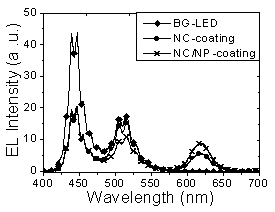 |
|
Fig. 1 Output spectra showing the relative intensities at three injection current levels after the CdSe/ZnS NCs are coated on the blue/green LED. |
Fig. 2 Output spectra showing the relative intensities of the blue/green LED (BG-LED), the CdSe/ZnS NC coating device (NC-coating), and the device of mixed coating of CdSe/ZnS NCs and Au NPs (NC/NP-coating) at the fixed injection current of 15 mA. |
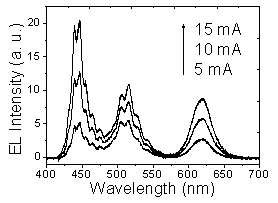 |
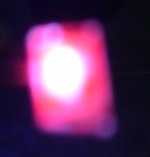 |
|
Fig. 3 Output spectra showing the relative intensities at three injection current levels in the device of mixed coating of CdSe/ZnS NCs and Au NPs. |
Fig. 4 Picture of the device with mixed coating of CdSe/ZnS NCs and Au NPs. |
宽能隙半导体实验室---冯哲川教授
本实验室主要专注在宽能隙半导体材料的应用及分析,其中以碳化硅(SiC)、氧化锌(ZnO)及氮基半导体为主要研究对象,目前的发展重点如下:
功率与节能应用之块状与磊晶碳化硅的创新研究
碳化硅(SiC)在高功率和高温度组件和节能电子系统中为一种具有吸引力的材料。在高温,高功率,高频率和高辐射的先进的节能电子组件中,多晶形态的碳化硅是相当有前瞻性的材料。碳化硅是唯一能被热氧化形成高质量的二氧化硅的化合物半导体。它能使碳化硅功率电子组件和硅基集成电路科技相结合,开拓新世纪的微电子工程发展。然而碳化硅在台湾的研究发展和工业制造是非常弱的,不像硅基集成电路以及氮化镓材料和III-V材料的发光二极管的案例那样,在台湾研究发展和工业制造中占有重要市场占有率。
因此本实验室目前致力发展先进的和创新的磊晶制程,利用先进的高温低压化学气相蒸镀科技,在大直径的碳芯片上,来实现立方碳化硅的异质磊晶,并将集中大的努力于研究3C-、6H-、和4H-SiC材料的光学、结构以及表面性质,并探索新的设计,或是改良现有的化学气相蒸镀系统。为台湾工业建立良好的基础去拓展碳化硅高温化学气相蒸镀的研究发展。这将会使台湾在碳化硅的研究发展上,赶上全球的先进水平,并做为学术和工业之间的桥梁,以促进台湾在碳化硅节能电子组件工业的发展。
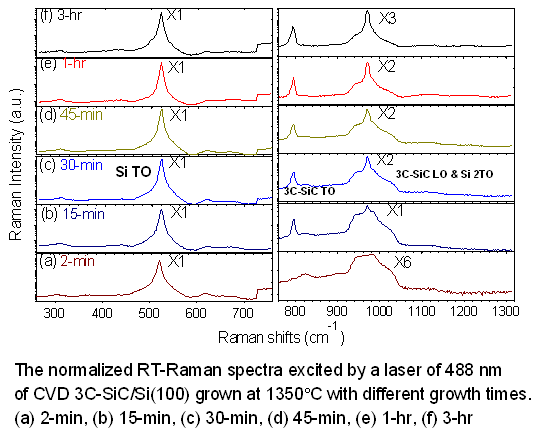 |
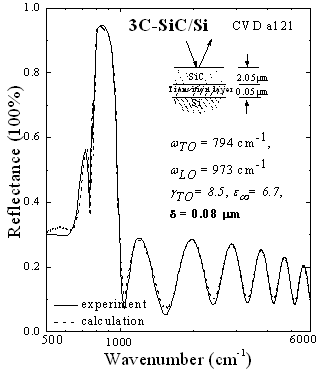 |
| IR reflectance spectrum and theoretical fits, including an interfacial layer, of a CVD-grown 3C-SiC/Si |
硅基薄膜太阳电池界面、表面、缺陷与微结构特性研究
众所皆知,台湾本身就是一个缺乏能源的国家,所以开辟新能源就是一个十分重要的课题。在人类的生活世界里,电能消耗是很厉害的,例如,大量电能在各种变电站,电力转换匣,功能电子组件中被无功地消耗掉。如果我们能发展出新型太阳电池组件,且能工作在恶劣环境下,那将是一即好的解决方法。我们计划发展新型高效率硅薄膜太阳电池研究以服务于台湾及人类社会。
过去单晶太阳电池占据市场的主要份额。目前硅薄膜太阳电池已逐渐成为太阳能市场的主流技术,主要原因为薄膜太阳电池比起单晶太阳电池具有生产成本较低及可大量减少硅材料使用量等优点。
本实验室将致力于硅基薄膜太阳电池界面、表面、缺陷与微结构特性研究,并且提供各阶段太阳电池及薄膜生长的快速检测与深入的科学技术研究,以期了解掌握并克服制作高效率薄膜太阳电池的技术障碍。
|
氮化镓基(GaN-based)材料及蓝光二极管 着重于研究金属氧化物化学气相磊晶(MOCVD)技术相关的发光暨缺陷工程,研究生长过程的缺陷和问题,深入发光机制的物理内涵,探索新路径以控制生长过程的缺陷且利用来增进发光的特性,以制成高质量的氮化物磊晶材料,利用多种的技术作跨领域的研究为研究计划所强调的重点。
|
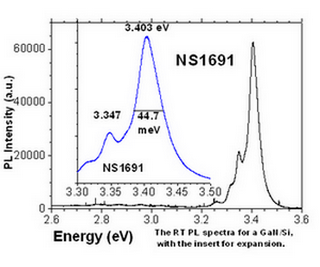 |
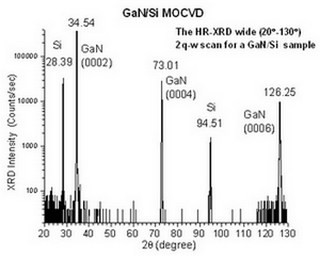 |
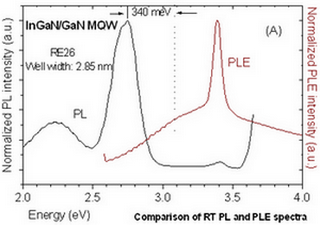 |
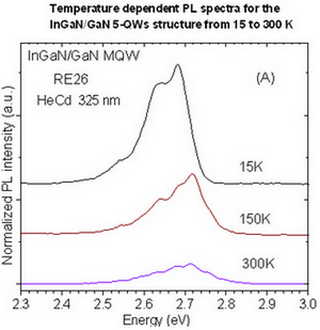 |
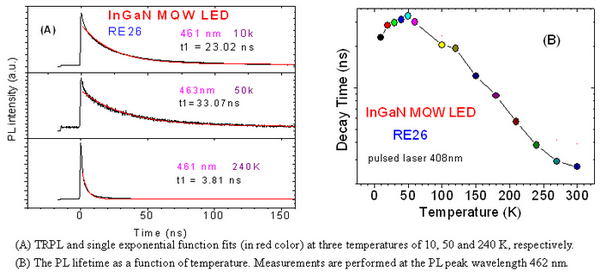 |
|
氧化锌(ZnO)及相关材料 ZnO、 = 3 \* ROMAN III- = 5 \* ROMAN V和InAlGaP等材料也在本实验室研究计划内,其中ZnO被认为是发光材料及组件产业中下世代的热门材料,而InAlGaP和AlGaAs材料则在半导体发光二极管和 激光产品中应用颇广,特别是在红光至近红外光波长范围的发光二极管,这些红光二极管结合氮化镓为基础的蓝光二极管,可形成白光发 光二极管的全频光谱,因此,研究计划也包含一部分为MOCVD磊晶成长InAlGaP和AlGaAs的异质结构。
|
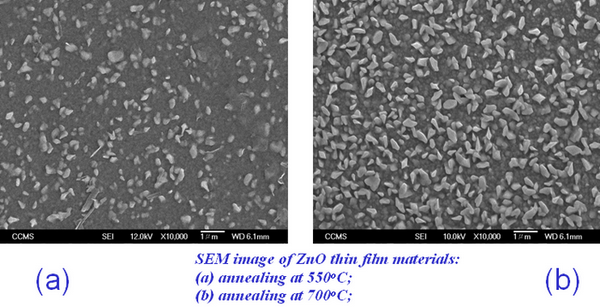 |
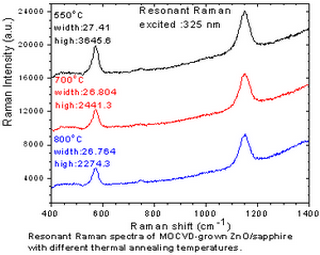 |
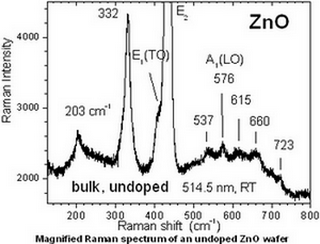 |
— 数据提供:影像显示光电科技特色人才培育中心.影像显示科技知识平台 —
— 整理:林晃岩教授、陈冠宇 —
![]() 新兴显示器PTA企图攻占超大尺寸、超薄型显示器市场
新兴显示器PTA企图攻占超大尺寸、超薄型显示器市场
虽然2008年初消费性电子展电浆显示器阵营纷纷推出超薄型电浆电视,然而电浆显示器阵营所展示机种的厚度仍然不若LCD或OLED面板/TV般那么薄。以目前电浆显示器所用玻璃基板厚度2.8 mm来计算,因电浆显示器同时需使用2片玻璃基板,故仅是玻璃基板厚度即达到5.6 mm,此外尚需计算2片电浆显示器前、后基板中间阻隔壁的厚度0.15 mm。
然而目前有一种与电浆显示器发光原理相似的PTA显示器,其整体面板厚度可达到仅1 mm。PTA的全名为Plasma Tube Array, 从字面上的意思可了解到其发光原理与电浆显示器相同,但又为「管状」数组的显示器。电浆管数组(PTA)显示器的基本结构,在直径1mm真空玻璃管内,依序制作放电保护膜、荧光体、放电气体,形成与电浆显示器完全相同的发光结构。上述真空玻璃管称为电浆管(Plasma Tube),电浆管依照R、G、B复数排列,正面与底部分别粘贴设有电极的透明外部电极基板,因此,PTA面板有如众多并列的玻璃细管,再加上Film状的电极覆盖上去所组成。电浆管是利用包覆玻璃管壁形成的放电空间,利用显示电极与地址电极施加电压,形成与AC型电浆显示器的3电极放电结构完全相同的电极构造。除了使用传统电浆显示器的灰阶驱动技术,亦即ADS(Address Display-period Separation)次场界(sub field)技术之外,同时还直接沿用电浆显示器的驱动电路基本结构与电极驱动IC等关键性周边组件。直径1mm的真空玻璃管以R、G、B一组为单位构成间距3 mm的画素,接着在水平方向并排设置1000~2000个画素(总长度大约是3~6 m),就能够获得相当于对角尺寸150~250英吋超大型画面。
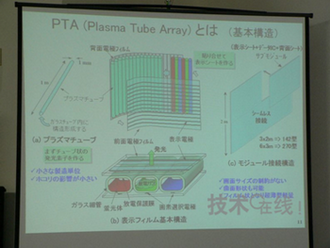 |
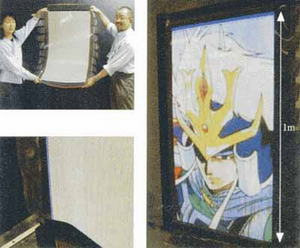 |
PTA显示器主要开发厂商为「筱田Plasma株式会社」, 该会社是取名自该会社代表取缔役会长、有电浆之父称号「筱田传」的姓。筱田传于1973年任职于富士通株式会社,自此以后皆从事电浆显示器研究开发工作,其于电浆显示器成就包括于1983年发明彩色电浆显示器的基本构造,1992年开发世界第1台21吋全彩电浆显示器等。筱田传于2005年6月成立筱田Plasma株式会社,专门研发与制造PTA显示器,PTA试制品第1次在2007年日本尖端信息与电子展 (Cutting-Edge IT & Electronics Comprehensive Show) 公开亮相,该显示器为43吋、重量仅800公克。2008年1月底,筱田Plasma株式会社一改过去单打独斗的态势,开始与「株式会社ULVAC」、「藤森工业株式会社」、「大电株式会社」策略联盟。筱田Plasma株式会社除与上述3家厂商在PTA显示器领域进行生产与技术上的合作外,并获得资金方面的挹注。「株式会社ULVAC」为负责开发PTA显示器相关的生产设备,而该公司并出资1亿日圆(约93.6万日圆)予筱田Plasma株式会社;在此之前,株式会社ULVAC主要是平面显示器的设备装置制造公司。「藤森工业株式会社」则负责film状电极的开发,并出资5,000万日圆(约46.8万日圆),该公司同时制造可降低光线反射的电浆显示器用滤光片(filter)。「大电株式会社」主要为从事荧光体材料的开发,荧光体材料几乎与电浆显示器完全相同,其出资金额为4,000万日圆(约37.5万美元)。
PTA的优点在于PTA面板厚度不到电浆显示器的1/5、重量亦为一般电浆显示器 的1/10、耗电量仅为同尺寸电浆显示器的1/2、且不需大型生产设备及无尘室设施等;相对而言,LCD与电浆显示器随玻璃基板大型化,投资金额呈等比级数增加。虽然PTA 显示器容易可达到100吋以上的大屏幕,然而现阶段最明显的缺点为分辨率不够精细,2个画素之间的间距即高达3 mm,故初期与LED显示器同,将先行导入公用显示器市场,又PTA显示器具超薄、轻量、低耗电量、可挠等特性,故能放置于屋顶天花板上、嵌入地板内、贴附在弯曲状的墙壁或圆柱状物体上、及制作成超宽型屏幕(例如赛马场、足球场用途)等。
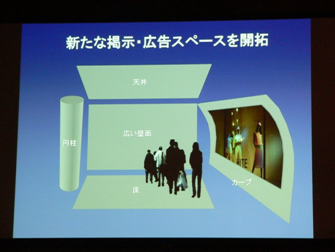 |
筱田Plasma株式会社预计于2008年上半开始量产PTA面板,计划于2008年下半出货予系统厂,最快将于2009年将开始销售,并将以150吋为优先导入尺寸,预定届时上市价格能与同尺寸LED显示器匹敌。
新闻出处:
http://www.digitimes.com.tw/n/article.asp?id=0000081458_A7H2SD3XDT6LN5S7W86SW
http://tech.digitimes.com.tw/print.aspx?zNotesDocId=0000050718_B6JLFZ8FRX0EUT29ADUJI
http://big5.nikkeibp.co.jp/china/news/flat/flat200711010116.html
偶尔禁食,可以让身体器官适度休息?
![]()
有此一说:
请问以下内容是真是假?
您好,我听我同事说,因为现在的人生活太富裕,吃太多鱼肉等食物,让肝肾有过多的负荷,所以有时候一天不吃东西只喝水或酸奶,可以让它们能适度的休息,不晓得这是不是正确的观念?谢谢!
KingNet
营养保健咨询科营养师回答:
(桃园敏盛综合医院健康美学中心 陈正育营养师)
禁食或者是断食法,其实不完全是挨饿,所谓禁食,即是减少我们平时进食的份量,再以果菜汁代替,以补充能量,而这样的方法已经沿用了好几世纪,无论中外都曾用过这种方法来调养生息,但是禁食应该经由专业的医事人员指导下进行,不可自行贸然采用,根据国外的研究显示,热量(饮食卡洛里)的限制,可能能够延长人类的寿命,尤其是对于中老年人,换言之,吃得越多并不代表大富大贵,相反地吃太多将可能是万病的根源,最近有文章发表在猴子身上这种理论已经获得证实。
更激进的,有人甚至主张这种总热量摄取的降低对于某些癌症可能会有限制癌细胞生长的效果,而这种理论最近在著名的癌症研究期刊中发表 (
Journal of the National Cancer Institute 1999;91:489-491,512-523),引起学界的注意。
研究者是哈佛大学医学院的Dr. Purna Mukherjee,
它们以兔子为对象,将摄护腺癌细胞植入各种不同热量摄食组的实验兔体内,
发现癌细胞的重量在限制热量20%的一组,竟然降低了62%,而限制热量40%的一组,则降低高达76%;总之,适时地减少热量的摄取,乃至于短时间的断食,的确能给身体器官有个喘息的机会,进而提高身体的机能。
只不过方法一定要正确,除了需要经医师的指导之下进行外,禁食期间勿仅仅喝水而已,还须配合补充膳食纤维(例如果菜汁、燕麦麸、甚至是芦荟汁),但切记!患有糖尿病者不可以尝试禁食法!
本文由【KingNet 国家网络医院】提供
版权所有 国立台湾大学电机信息学院光电工程学研究所 http://gipo.ntu.edu.tw/
欢迎转载 但请注明出处 http://gipo.ntu.edu.tw/monthly.htm
